Super User
ANDRITZ successfully starts up P-RC APMP line delivered to Guangxi Sun Paper, China
International technology group ANDRITZ has successfully started up a chemi-thermomechanical pulping system delivered to Sun Paper for its mill in the city of Beihai, Guangxi, China.
The proven ANDRITZ P-RC APMP (Pre-Conditioning Refiner Chemical Alkaline Peroxide Mechanical Pulp) line features a capacity of 600 admt/d and processes eucalyptus wood chips as raw material to produce high-quality pulp for the production of printing and writing paper. It is now the sixth
P-RC APMP line to be delivered to the Sun Paper Group by ANDRITZ.
The scope of supply comprises all key equipment for the fiberline, including the following technological highlights:
- Two-stage impregnation system with outstanding MSD Impressafiners for efficient pre-treatment and optimum chemical impregnation of wood chips prior to refining
- High-consistency (HC) refining stage with two parallel ANDRITZ S2070 single-disc refiners for superior fiber properties and highest production flexibility
- Low-consistency (LC) refining stage with ANDRITZ TwinFlo refiners to develop optimal pulp strength at lowest shive content
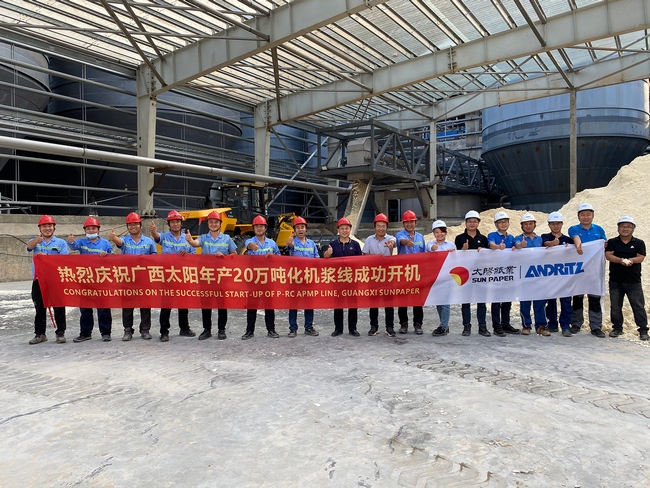 Successful start-up of the ANDRITZ P-RC APMP line at Guangxi Sun Paper’s Beihai mill © ANDRITZ
Successful start-up of the ANDRITZ P-RC APMP line at Guangxi Sun Paper’s Beihai mill © ANDRITZ
Cao Yanjun, Vice General Manager at Sun Paper, comments: “In close cooperation with the highly dedicated team from ANDRITZ China, we were able to start up the new P-RC APMP line at our Beihai mill in only 24 days. That’s an impressive start-up curve! The new line is already delivering excellent mechanical pulp within such a short time for our top-quality paper production.”
Li Ke, Project Director, Paper, Fiber and Recycling Division at ANDRITZ China, adds: “It’s an honor to have Sun Paper among our key customers and support them in achieving their goals. Our mission is to focus on all aspects of the project – future-oriented line set-up, superior technology, and all-in service.”
Guangxi Sun Paper was established in 2019 to build an integrated pulp and paper mill in Beihai. The mill will be constructed in two phases over approximately five years. When completed, it will have a total annual pulp and paper capacity of 3.5 million tons.
ANDRITZ GROUP
International technology group ANDRITZ offers a broad portfolio of innovative plants, equipment, systems and services for the pulp and paper industry, the hydropower sector, the metals processing and forming industry, pumps, solid/liquid separation in the municipal and industrial sectors, as well as animal feed and biomass pelleting. Plants for power generation, flue gas cleaning, recycling, and the production of nonwovens and panelboard complete the global product and service offering. Innovative products and services in the industrial digitalization sector are offered under the brand name Metris and help customers to make their plants more user-friendly, efficient and profitable. The publicly listed group has around 26,800 employees and more than 280 locations in over 40 countries.
ANDRITZ PULP & PAPER
ANDRITZ Pulp & Paper provides equipment, systems, complete plants and services for the production of all types of pulp, paper, board and tissue. The technologies and services focus on maximum utilization of raw materials, increased production efficiency and sustainability as well as lower overall operating costs. Boilers for power generation, flue gas cleaning systems, plants for the production of nonwovens and panelboard (MDF), as well as recycling and shredding solutions for various waste materials also form a part of this business area. State-of-the-art IIoT technologies as part of Metris digitalization solutions complete the comprehensive product offering.
ANDRITZ successfully starts up new PrimeReel system at Knauf Petroboard, Russia
International technology group ANDRITZ has successfully started up a new reel as part of the KM2 board machine rebuild at Knauf Petroboard, in Kommunar, Russia.
The KM2 – with a basis weight range from 100 to 320 g/m2 – has a design speed of 700 m/min and a working width of 4.26 m. It has a maximum capacity of 155,000 t/a for production of gypsum board and uses 100% wastepaper as raw material.
The rebuild includes a new PrimeReel system with new reel spools, drives and controls, ensuring consistent paper quality from the first to the last wrap during reeling. The new reel reduces the volume of rejects previously generated and enables the use of larger reel diameters, thus resulting in less frequent reel spool changes.
ANDRITZ rebuilt the complete wet section (comprising the approach flow system and wire section) as well as the complete electrical drives (MMD) of KM2 in 2018.
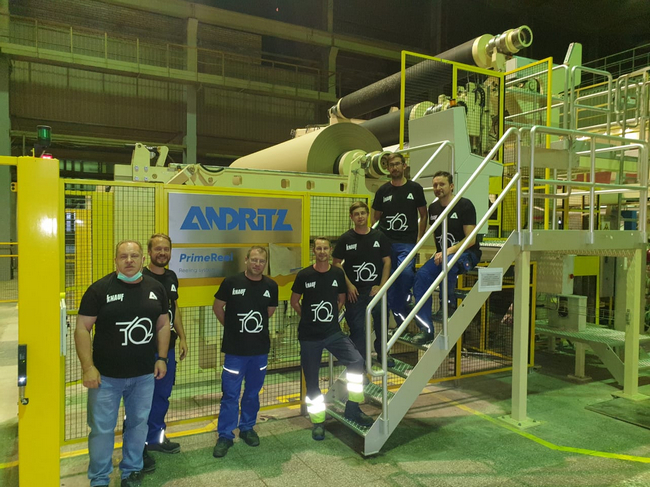 The start-up team in front of the new PrimeReel system at Knauf Petroboard’s KM2 © ANDRITZ
The start-up team in front of the new PrimeReel system at Knauf Petroboard’s KM2 © ANDRITZ
Yuriy Mikhaylov, general director of Knauf Petroboard AG, says: "We are really impressed by the work of the ANDRITZ team. Despite the very challenging conditions due to the Covid pandemic, the start-up ran smoothly, and the rebuilt machine went into operation before the scheduled date.”
Knauf Petroboard, a member of the international Knauf Group, has a leading market position in Russia and the CIS countries in producing packaging board as well as gypsum board, which is used in the production of plasterboard.
ANDRITZ GROUP
International technology group ANDRITZ offers a broad portfolio of innovative plants, equipment, systems and services for the pulp and paper industry, the hydropower sector, the metals processing and forming industry, pumps, solid/liquid separation in the municipal and industrial sectors, as well as animal feed and biomass pelleting. Plants for power generation, flue gas cleaning, recycling, and the production of nonwovens and panelboard complete the global product and service offering. Innovative products and services in the industrial digitalization sector are offered under the brand name Metris and help customers to make their plants more user-friendly, efficient and profitable. The publicly listed group has around 26,800 employees and more than 280 locations in over 40 countries.
ANDRITZ PULP & PAPER
ANDRITZ Pulp & Paper provides equipment, systems, complete plants and services for the production of all types of pulp, tissue, paper and board. The technologies and services focus on maximum utilization of raw materials, increased production efficiency and sustainability as well as lower overall operating costs. Boilers for power generation, flue gas cleaning systems, plants for the production of nonwovens and panelboard (MDF), as well as recycling and shredding solutions for various waste materials also form a part of this business area. State-of-the-art IIoT technologies as part of Metris digitalization solutions complete the comprehensive product offering.
Metsä Board is progressing with its fossil free target at its Kyro mill
The Hämeenkyrön Voima power plant, from which Metsä Board's Kyro mill buys energy, has replaced the peat it burns with renewable energy. In the future, the power plant aims to use wood-based fuels from Metsä Group's production and wood procurement by-products. By not burning peat, Metsä Board Kyro's share of fossil fuels in total fuel demand will be reduced from just over a quarter to about a tenth.
The phase-out of peat has required significant investments in power plant technology to control boiler corrosion damage and optimise running conditions. Previously approximately one fifth of the fuel used by the plant has been peat. Thanks to the investments, the energy and local district heat from the mill will be produced in a more environmentally friendly way.
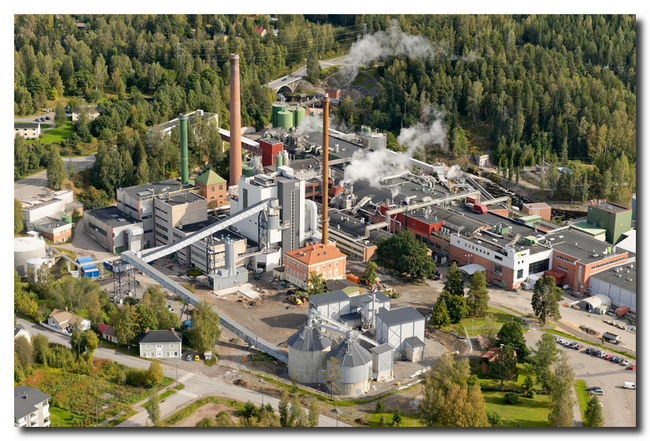 Metsaboard Kryo Mill Aerial photo
Metsaboard Kryo Mill Aerial photo
Metsä Board, part of Metsä Group, targets to achieve fossil-free production and products by the end of 2030. Moving away from peat-based energy will help Metsä Board towards these goals.
Metsä Board
Metsä Board is a leading European producer of premium fresh fibre paperboards. We focus on lightweight and high-quality folding boxboards, food service boards and white kraftliners. The pure fresh fibres we use in our products are a renewable resource, traceable to origin in sustainably managed northern forests. We are a forerunner in sustainability, and we aim for completely fossil free mills and raw materials by 2030.
Together with our customers we develop innovative packaging solutions to create better consumer experiences with less environmental impact. In 2020, our sales totalled EUR 1.9 billion, and we have about 2,400 employees. Metsä Board, part of Metsä Group, is listed on the Nasdaq Helsinki.
Metsä Group
Metsä Group leads the way in the bioeconomy. We invest in growth, developing bioproducts and a fossil free future. The raw material for our products is renewable wood from sustainably managed northern forests. We focus on the growth sectors of the forest industry: wood supply and forest services, wood products, pulp, fresh fibre paperboards, and tissue and greaseproof papers.
Metsä Group’s annual sales is approximately EUR 5.5 billion, and we have around 9,200 employees in 30 countries. Our international Group has its roots in the Finnish forest: our parent company is Metsäliitto Cooperative owned by 100,000 forest owners.
MM Group has committed to net zero emissions until 2050
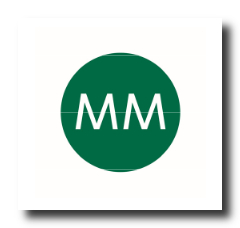 The Mayr-Melnhof Group (MM) has joined the global "Business Ambition for 1.5°C" initiative to contribute to limiting global warming to 1.5 degree through appropriate measures. As part of this initiative, launched by the UN Global Compact and Science Based Targets initiative (SBTi), among others, MM commits to setting science-based targets to seek for net-zero emissions in the whole value chain by 2050 at the latest. MM thus increases the pace of engagement on climate change at the time of major global milestones such as the UN Climate Change Conference COP26.
The Mayr-Melnhof Group (MM) has joined the global "Business Ambition for 1.5°C" initiative to contribute to limiting global warming to 1.5 degree through appropriate measures. As part of this initiative, launched by the UN Global Compact and Science Based Targets initiative (SBTi), among others, MM commits to setting science-based targets to seek for net-zero emissions in the whole value chain by 2050 at the latest. MM thus increases the pace of engagement on climate change at the time of major global milestones such as the UN Climate Change Conference COP26.
Peter Oswald, CEO of the MM Group: "MM is a Sustainability Company at the forefront of plastic waste prevention with innovative recyclable packaging made from renewable raw materials. In addition, the reduction of greenhouse gas emissions to mitigate climate change is an integrated and integral part of our corporate strategy. That’s why we set ourselves ambitious, science-based targets and take an active part in the Business Ambition for 1.5°C initiative to jointly drive a climatefriendly economy."
MM is Europe's leading producer of cartonboard and folding cartons with an attractive offer in Uncoated Fine Papers and Packaging Kraft Papers. The focus is on sustainable and innovative fiber-based packaging solutions. Including the latest acquisitions, MM generates sales of approximately EUR 3.2 billion and employs around 12,500 people.
Watson-Marlow announces details of the new U.S. manufacturing facility bringing them closer to customers in the region
Watson-Marlow is pleased to announce that construction began in October 2021, on a new state-of-the-art manufacturing facility in the United States, with first production due in late 2022. Following an announcement made earlier this year, the Company is pleased to provide further details about the new facility which will be dedicated to its range of industry leading products, including peristaltic pumps, tubing, fluid path solutions and BioPure components.
Part of Spirax-Sarco Engineering plc, a FTSE100 Company, Watson-Marlow specializes in high-quality fluid management solutions for the life sciences and process industries. This significant investment in the expansion of its manufacturing capacity will support the Company’s future growth in the Americas.
Located in Devens, Massachusetts, USA, the 150,000 square foot (14,000 square metres) facility will be close to the life sciences hub in the Cambridge/Boston area. The site will incorporate a suite of eight ISO14644-1 Class 7 cleanrooms, warehousing and offices, with space for two further cleanrooms within the initial footprint. With segregated cleanroom and non-cleanroom production capabilities, Watson-Marlow’s new U.S. facility will strengthen the support the Company provides to customers in the region across its core sectors of pharmaceutical and biotechnology, medical diagnostics, and process industries.
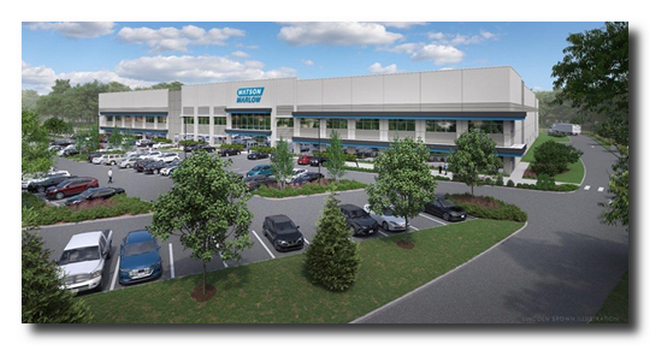
“The new U.S. facility is an important milestone in the Watson-Marlow company history and marks a significant commitment to serving our customers in the Americas region.” Says Andrew Mines, Watson-Marlow Managing Director, “This exciting development is bringing us closer to our customers whose purpose is to help the world around us, from advancing cell and gene therapies through to ensuring people have access to clean drinking water. Together we will continue to develop market-leading fluid management solutions to engineer a more sustainable future. A huge thanks goes to the Watson-Marlow, BioPure, Americas and Watson-Marlow Central Support teams that are making this happen, as well as to our parent Company, Spirax-Sarco Engineering who have enabled us to make such a significant investment in our future.”
Watson-Marlow is an award-winning employer and this new facility will bring significant job opportunities to the local area, with over 150 positions coming available. Production at the new facility will replicate that of Watson-Marlow’s European sites, ensuring continued product quality for customers, by using the same raw materials, components, processes and work instructions. Completion of the facility is due in late 2022, with the first products due to be shipped from the site in late Q4.
Watson-Marlow Fluid Technology Group (WMFTG) is the world leader in peristaltic pumps and associated fluid path technologies. The Group comprises ten established brands, each with their own area of expertise. Together they provide leading engineering solutions across the food, pharmaceutical, chemical and environmental industries.
WMFTG is headquartered in the United Kingdom with international operations in 44 countries and employing over 1750 people globally.
Watson-Marlow is a wholly owned subsidiary of multi-national industrial engineering Group, Spirax-Sarco Engineering plc, a constituent of the FTSE 100, with strategically located manufacturing plants around the world and over 8,200 employees, including 1,950 direct sales and service engineers.
As a leading engineering group, we have an ethical responsibility to manage our economic, environmental and social impacts, while helping our customers and suppliers to do the same. In August this year, WMFTG committed to achieving net zero carbon by 2030.
Further information can be found at www.wmftg.com
Essity in collaboration for responsible forest operations in Russia
The hygiene and health company Essity is collaborating with the Forest Stewardship Council (FSC) and The Consumer Goods Forum’s (CGF) Forest Positive Coalition of Action initiative to further strengthen responsible forest management, nurture high conservation value forests and increase the certification of forest operations in north-western Russia. Deforestation is a major topic at the ongoing climate summit COP26 in Glasgow, since deforestation and forest degradation affect climate change on a large scale.
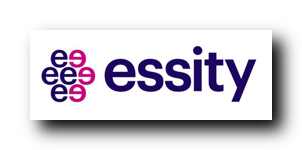 Essity is co-financing the project, which aims to provide trainings and workshops to forest managers and government officials to increase the uptake of sustainable forest management practices in north-western Russia, as well as engage communities and other local stakeholders in a landscape planning process. The project is a follow-up to an earlier successful collaboration in which FSC, together with Greenpeace Russia and the WWF Russia, worked with the Russian government to introduce formal protection of high conservation value forests in the Dvinsky region. These forests in north-western Russia are Europe’s largest intact forest landscapes with high nature values. In 2021, Essity is also collaborating with the members of The CGF’s Forest Positive Coalition in several other projects to strengthen forest management and prevent deforestation. This endeavor to strengthen regeneration and identify high conservation value forests in need of protection is in line with Essity’s commitment to promote biodiversity and that more forest operations are to be certified.
Essity is co-financing the project, which aims to provide trainings and workshops to forest managers and government officials to increase the uptake of sustainable forest management practices in north-western Russia, as well as engage communities and other local stakeholders in a landscape planning process. The project is a follow-up to an earlier successful collaboration in which FSC, together with Greenpeace Russia and the WWF Russia, worked with the Russian government to introduce formal protection of high conservation value forests in the Dvinsky region. These forests in north-western Russia are Europe’s largest intact forest landscapes with high nature values. In 2021, Essity is also collaborating with the members of The CGF’s Forest Positive Coalition in several other projects to strengthen forest management and prevent deforestation. This endeavor to strengthen regeneration and identify high conservation value forests in need of protection is in line with Essity’s commitment to promote biodiversity and that more forest operations are to be certified.
The Consumer Goods Forum is a global partnership organization for manufacturers and consumer goods retailers. In addition to the initiative to increase responsible forest operations, The CGF runs a range of different programs in sustainability, health and product safety. In conjunction with the ongoing COP26 in Glasgow, The CGF is holding a panel discussion on the industry’s transition to net zero emissions, which Essity intends to achieve by 2050. Magnus Groth, Essity’s President and CEO will be taking part in the discussion together with other business leaders and representatives from the United Nations. The discussions will focus on how fast-moving consumer goods companies and retail companies collaborate pre-competitively with industry peers and NGO stakeholders to achieve this interim goal and halve emissions by 2030 and be NetZero by 2050.
“We must increase collaboration if we are to achieve our own goals and contribute to our joint targets for greater sustainability. An exchange of knowledge and experiences will strengthen our ambitions and ability to reach targets in the short and long term,” says Magnus Groth, President and CEO of Essity.
Essity is a leading global hygiene and health company. We are dedicated to improving well-being through our products and services. Sales are conducted in approximately 150 countries under the leading global brands TENA and Tork, and other strong brands, such as JOBST, Leukoplast, Libero, Libresse, Lotus, Nosotras, Saba, Tempo, Vinda and Zewa. Essity has about 46,000 employees. Net sales in 2020 amounted to approximately SEK 122bn (EUR 11.6bn). The company’s headquarters is located in Stockholm, Sweden, and Essity is listed on Nasdaq Stockholm. Essity breaks barriers to well-being and contributes to a healthy, sustainable and circular society. More information at www.essity.com.
Valmet and CMPC have finalized the agreement for major technology and automation delivery for Guaíba pulp mill’s modernization project in Brazil
Valmet and CMPC have finalized the agreement of which Valmet and CMPC signed a letter of intent in September 2021 (Valmet’s press release on September 20, 2021). According to the agreement, Valmet will deliver key technology and automation for CMPC’s BioCMPC project. The target is to modernize and increase the production capacity of the Guaíba pulp mill’s line 2 from 1.5 million ADt/y (air dry tonnes per year) to 1.85 million ADt/y. The upgraded mill is expected to start operation in the fourth quarter of 2023.
The order is included in Valmet's orders received of the fourth quarter 2021. The value of the order is not disclosed.
BioCMPC project’s main targets are to both increase the sustainability of the pulp mill and modernize the production technology. The project will include new control and environmental management measures across the mill. The project has been carefully designed, based on CMPC's mission to sustainably produce and market wood, pulp, paper and tissue products of first-rate quality that are competitive, add value and create development opportunities for its employees and local communities.
“CMPC has chosen the most environmentally efficient and sustainable solutions. Valmet’s delivery offers the full benefits of our unique offering consisting of process technology, automation and services. We will continue the excellent cooperation by improving the mill performance and including more industrial internet solutions combined with expert services on site and remotely,” says Celso Tacla, Area President, South America, Valmet.
“We provide the mill with our latest technological innovations designed for high efficiency which will allow the mill to be one of the most sustainable mills in Brazil with low environmental impact. The project will have a significant employment impact both for our engineering, production and project execution in Brazil and the Nordics,” says Bertel Karlstedt, Business Line President, Pulp and Energy, Valmet.
“Valmet was chosen to be the key technology and automation provider for the BioCMPC project, and we are very happy to participate in this innovative and modern project. All equipment and solutions included in this project represent proven technology that provides better environmental performance and increased production efficiency. The project brings benefits to the customer, community as well as local and global environment,” says Fernando Scucuglia, Director, Pulp and Energy, South America, Valmet.
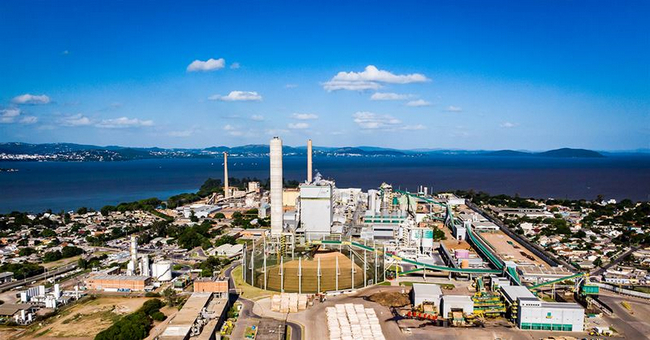 Valmet will deliver key technology and automation for CMPC’s BioCMPC project.
Valmet will deliver key technology and automation for CMPC’s BioCMPC project.
Technical information about the delivery
Valmet’s delivery for the Guaíba pulp mill line 2 modernization will include rebuild of the pulp drying, fiberline, evaporation and white liquor plant, a new recovery boiler and new ash treatment, and extended distributed control system including advanced industrial internet features. The technology delivery is supported by spare parts packages. The upgraded line is optimized for high reliability and performance with low environmental impact.
The pulp drying line upgrade will increase the drying and baling capacity and performance with the same high operational safety requirements that always guide Valmet’s projects. The upgrade includes improvements to screening and drying, automatic tail threading and an additional baling line.
The fiberline upgrade includes cooking plant technology update, fiberline improvements in brown stock and post oxygen washing and a new additional bleaching stage. The upgrade gives flexibility to minimize water usage and effluent generation improving the fiberline sustainability and environmental KPIs.
The recovery island modernization includes capacity increase of the recaustisizing and lime kiln, evaporation plant upgrade to eight effects, new high-power recovery boiler with electrostatic precipitators (ESP) and ash treatment with Ash Leaching Duo technology. The recovery island modernization emphasizes high energy efficiency and low emissions. The collection and handling of the mill’s odorous gases is further improved with NCG upgrades across process islands.
The automation delivery includes Valmet DNA distribute control system, advanced process controls (APC) for selected process areas, analyzers and online measurements.
The delivery is supported with extensive Valmet Industrial Internet (VII) services package with onsite and remote expert support. The VII services include Valmet Performance Center support, Data Discovery, Dynamic Center Line Advisor, Performance Monitoring tools and Operator Training Simulator.
About the customer CMPC
CMPC produces and markets wood, pulp, packaging products, paper, tissue, and personal care products from certified plantations. The Company has over 641,000 hectares of forest plantations, mainly pine and eucalyptus, located in Chile, Brazil and Argentina. CMPC Pulp SpA operates 4 production lines in Chile and 2 in Brazil, with total annual production capacity of approximately 4.1 million metric tons of pulp.
Valmet is the leading global developer and supplier of process technologies, automation and services for the pulp, paper and energy industries. We aim to become the global champion in serving our customers.
Valmet's strong technology offering includes pulp mills, tissue, board and paper production lines, as well as power plants for bioenergy production. Our advanced services and automation solutions improve the reliability and performance of our customers' processes and enhance the effective utilization of raw materials and energy.
Valmet's net sales in 2020 were approximately EUR 3.7 billion. Our 14,000 professionals around the world work close to our customers and are committed to moving our customers' performance forward - every day. Valmet's head office is in Espoo, Finland and its shares are listed on the Nasdaq Helsinki.
Read more www.valmet.com
Climate case for wood
New manifesto calls for greater use of wood to help nations decarbonise
An international Wood Manifesto setting the future roadmap for timber and wood use in construction and other products was launched in the UK last week just ahead of the COP26 climate talks. The document seeks to convey that wood is the key material to decarbonise the built environment both quickly and at scale.
Emissions from the built environment come from two main sources: the energy we consume within buildings for heating, cooling and power (operational emissions) and the emissions associated with the extraction, processing and manufacture of building products (embodied emissions).
The Manifesto “Growing Our Low-Carbon Future: Time for Timber” is a collaboration of work led by the global wood industry’s COP26 International Partners Advisory Body as well as the European Confederation of Woodworking Industries and the European Organisation of the Sawmill Industry, as well as other international partners.
David Hopkins, Chief Executive of the Timber Trade Federation, said, “Going into COP26 the case for embracing the forest and timber industries has never been stronger or more urgent. Wood products can create better livelihoods for millions, and a built environment which works in harmony with nature.”
Roy Southey, executive director of Sawmilling South Africa, agrees that the world can make greater use of sustainable wood to transform the built environment, which is currently responsible for approximately 40 per cent of global energy related CO2 emissions. “South Africa is ripe for scaling up the use of timber in construction however many people perceive wood as rudimentary or weak. But for engineering professionals and architects of mass timber structures, there is significant opportunity for innovation, localisation and employment creation.”
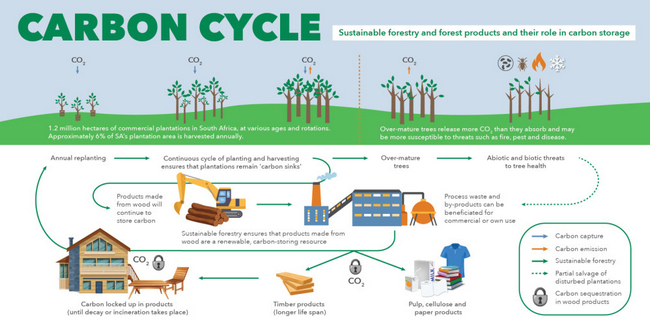
“The new Wood Manifesto will be a key step in not only finding new ways to use an age-old material that stores carbon but that also supports economies and livelihoods and provides everyday products,” concludes Southey.
“The increased use of wood and fibre-based products from sustainably managed plantations and forests will be key in combating climate change this century,” says Jane Molony, executive director of the Paper Manufacturers Association of South Africa, who will also be chairing a side-event on this topic at COP on 11 November.
The largest sustained mitigation benefit will be achieved through a sustainable forest management strategy that maintains or increases forest carbon stocks, while producing an annual sustained yield of timber, fibre or biomass. “This is exactly how our local forestry sector has operated for decades,” asserts Molony, adding that multiple trees are planted for every one which is harvested.
“From construction of mid- and high-rise buildings to single-use plastic replacements made from paper and cardboard, wood is a wonder fibre,” Molony said.
Wood is a naturally renewable material which:
- Sequesters carbon in forests and timber plantations as trees grow.
- Stores carbon in harvested wood products such as timber structures, pulp and paper.
- Substitutes for carbon intensive materials such as steel, concrete and plastics.
- Drives sustainable forest management leading to greater growth.
- Contributes to a circular economy as wood products can be reused, recycled, and recovered for low-carbon energy at end-of-life.
The manifesto was launched on 28 October, during the Royal Institute of British Architect’s Built Environment Summit to a global audience. Speaking at the launch of Time for Timber, Andrew Waugh of Waugh Thistleton Architects said, “Wood and wood-based materials offer solutions based on existing business models and proven technology. This is ‘carbon capture and storage’ in action now – with no further research or technological breakthroughs needed.
The five recommendations included in the report seek to rapidly scale up global forestry and timber industries and enhance the ability of the supply chain to minimise CO2 emissions across the lifecycle of any wood product:
- Embed mandatory lifecycle assessments and embodied carbon thresholds within local and national building plans.
- Increase the use of wood within new builds and renovations.
- Drive the growth of the bio-based circular economy through sustainable public procurement.
- Facilitate resource efficient use of wood, paper and recycling, especially collection and sorting in municipalities, and develop measures to gain access to post-consumer fibre, an invaluable secondary raw material resource.
- Increase training to upskill workers and create new jobs to boost the development of a sustainable and circular bioeconomy.
Brown Machine Group is now BMG
New name reflects growth and integration into complete turn-key solution provider in the plastic and paper industry
Brown Machine Group, the world’s leading provider of forming, tooling and automation solutions for the global packaging industry, announces that it is changing its name to BMG to reflect its growth and market position as a leading global turn-key solutions provider for the plastic and paper packaging industry.
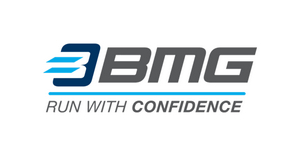 Brown Machine Group was originally created with the purpose of unifying a collection of industrial brands into one family. The company has grown steadily, including by recently acquiring GN Thermoforming. The company’s new branding as BMG brings together the companies already owned by Brown Machine Group under one consistent name.
Brown Machine Group was originally created with the purpose of unifying a collection of industrial brands into one family. The company has grown steadily, including by recently acquiring GN Thermoforming. The company’s new branding as BMG brings together the companies already owned by Brown Machine Group under one consistent name.
“BMG is Brown, Lyle, GN, Freeman, NAS and aXatronics. Brown Machine Group was already being shortened to BMG both externally and internally, and we believe the change is more inclusive to our family of brands and is easy for our customers to identify and remember,” explains Greg Wolf, BMG’s President and CEO. “BMG is our umbrella, and each brand can talk about solutions across the portfolio to fit customer needs. Together, BMG represents experience, innovation, and superior customer service, with a reputation for delivering solutions to improve consistency, productivity, and profitability. We look forward to building on BMG’s solid foundation in future growth through acquisition.”
In conjunction with the name change, BMG has aligned its businesses into three core areas to serve its customers:
- BMG FORMING SOLUTIONS, which offers a wide variety of sizes and capabilities for thermoforming machines through the Brown, Lyle, and GN product offerings;
- BMG TOOLING SOLUTIONS, which offers forming, trim, form-fill seal and contact heat tooling by Freeman and GN;
- BMG AUTOMATION SOLUTIONS, which offers robotic material handling and packaging automation by integrating NAS and Axatronics products.
Visit www.BMG-Solutions.com for more information.
About BMG
BMG in Beaverton, MI, is a global leader in thermoforming, tooling and automation with best-in-class quality and innovative product lines. It designs and manufactures a complete line of continuous thermoforming equipment, tooling, material handling and packaging automation, robotics, and related services including system upgrades, prototyping, process optimization, and technical support. Its equipment has been “Made in North America” for nearly 70 years, with systems operating in over 70 countries serving customers worldwide. Visit www.BMG-Solutions.com for more information.
AFT stock prep and approach flow equipment for JK Paper new multi-layer board machine
JK Paper Limited, one of the largest pulp and paper producers in India, selected AFT to supply a POM® approach flow and stock preparation system for their latest packaging board expansion project. PM5 is a 170 000 tpa multi-layer board machine at CPM, Fort Songadh in Gujarat, India. The new machine successfully ran its first paper reel in early September to begin commercial production this quarter.
The wet end system includes a full POM approach flow for multi-layer machine with stock processors and degasser arrangements. Basic engineering and mill site services were included as part of the AFT offerings.
Compared to traditional systems, the POM paper machine wet end with headbox screening delivers superior stock cleanliness in a compact and efficient package. Without the need for traditional storage tanks, POM runs smoothly with lower water and energy usage for an enhanced environmental performance.
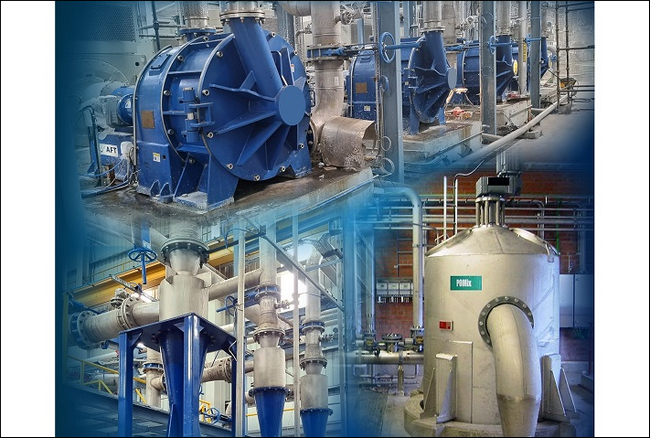
“The installation allows for fast grade changes in a cleaner, short circulation system - with less air and biological build-up to yield fewer sheet defects and breaks, which is best for our multi-ply operation”, says, Mr. S K Jain, Head – Board Projects.
In addition, AFT supplied a complete stock preparation system. The refiner design increases production capacity for a single unit while offering easy access for maintenance and filling changes. Low intensity refining is achieved with Finebar® conical filling technology for optimum fiber development with low energy use.
Sourav Das, AFT Regional Sales & Marketing Manager - Asia Pacific, says “AFT is excited to be part of this JK Paper project. We are committed to delivering innovative technology that helps our customers produce high quality products in a sustainable way”.
About AFT:
AFT is a global supplier specialized in stock preparation, screening, refining and paper machine approach flow systems. With over 100 years of experience, we offer expert solutions that help mills produce more while using less energy, water and chemicals. Our solutions are tailored to the customer’s furnish, their application and the end product being produced in order to optimize their return on investment. For more information, please contact us at This email address is being protected from spambots. You need JavaScript enabled to view it..
